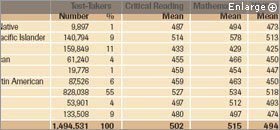Last week’s announcement that composite SAT scores dipped for the second year in a row since the college-entrance exam’s overhaul in 2005 has sparked debate over the significance, if any, of such short-term declines.
Although the drop to an average of 1511 on a scale of 2400 was slight in percentage terms, average performance among the 1.49 million 2007 graduates who took the closely watched 81-year-old exam fell on all three sections of the test.
On a scale of 200 to 800 points, the average scores dropped 1 point on the critical-reading section, to 502; 3 points in mathematics, to 515; and 3 points, to 494, on the writing section, now in its second year.
“I would say, ‘Hmm, it’s a warning sign,’ ” said Daniel M. Koretz, a professor of education at Harvard University’s graduate school of education, who downplayed the importance of year-to-year fluctuations in the low single digits. “If we keep getting these kinds of declines, then that’s something we’ve got to start worrying about.”
College Board officials Gaston Caperton, center, and Laurence Bunin, left, listen as board research director Wayne J. Camara discusses the scores of this year’s college freshmen.
—Christopher Powers/Education Week

Laurence Bunin, the general manager of the SAT program at the New York City-based College Board, the test’s sponsor, said at the Aug. 28 press conference here that “the scores … are really in an expected range.” The Educational Testing Service, of Princeton, N.J., administers the SAT for the board.
Wayne J. Camara, the vice president of research and analysis for the College Board, called the dip in scores since last year “not statistically significant.” But he said the declines are “primarily attributable to a larger number of minority students’ taking the test.”
Minority students accounted for nearly four in 10 test-takers in this year’s graduating class, making it the most ethnically diverse class of SAT-takers to date.
Moreover, Mr. Camara noted, this was the first year in which Maine’s high school seniors were required to take the SAT to graduate.
Difficulty the Same?
College Board officials say the new SAT, which includes not only the new essay section but also Algebra 2-based questions not found in the pre-2005 exam, is no harder than the test’s older version, an assurance critics question.

SOURCE: College Board
“After they said [the scores of] last year were unusual, [this year’s scores] are starting to look like a pattern,” said Robert Schaeffer, a spokesman for the National Center for Fair & Open Testing, a Cambridge, Mass.-based testing-watchdog group.
“It’s especially hard to explain when ACT scores were up in much the same peer group,” he added, referring to the other widely used college-entrance exam, administered by the Iowa City, Iowa-based nonprofit ACT Inc. The class of 2007’s average score on the ACT rose one-tenth of a percent over the class of 2006’s.
Mr. Bunin said, however, that the new SAT test “was very carefully constructed to equate back” to the pre-2005 version.
In the class of 2007, 24 percent of students first learned either a language other than English or another language at the same time they learned English. That’s up 1 percentage point over last year’s class, and 7 percentage points over the class of 1997, the College Board reported.
The board also reported a 31 percent increase over the past two years in the number of students receiving SAT-fee waivers, intended for students from low-income families.
“I am encouraged by the greater numbers of students from all walks of life who are taking on the challenge of the SAT and college,” Gaston Caperton, the president of the College Board, said in a statement.
Harvard’s Mr. Koretz also applauded the increasing diversity of SAT-takers, and suggested that score declines needed to be viewed in that context.
“The kids that are being added [to the pool of SAT-takers] are from historically underserved and lower-scoring groups. That tends to push scores down,” Mr. Koretz said.
He posed this analogy: “If a hospital starts bringing in more and more old patients and the mortality rate is still flat, that’s good. Old people die more.”
Thomas Toch, a co-director of the Washington-based think tank Education Sector, also downplayed the importance of one-year gains or losses on the SAT—not only because such minute shifts rarely fall outside the margin of error, but also because he doesn’t believe the exam measures learning very well.
“SAT scores are largely a function of family income; they correlate more strongly with privilege than any other factor,” he said. “We should pay more attention to NAEP [the National Assessment of Educational Progress], which measures large samples of students on more curriculum-specific matter.”
Gender gaps on all sections also remained mostly static since last year. The mean score for boys on the writing section continued to lag behind that of girls by 11 points, and the boys’ mean score on the math section continued to best the girls’ by 34 points.
Taking the long view, the mean score on the critical-reading section, formerly known as the verbal section, has declined 28 points since the class of 1972 took the SAT, according to the College Board. The mean math score has risen 6 points since then.




